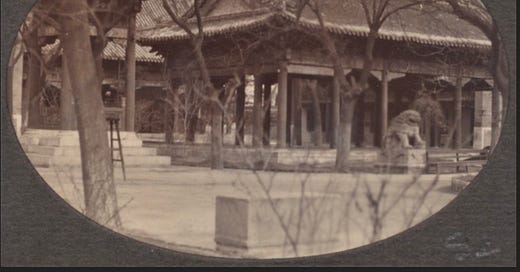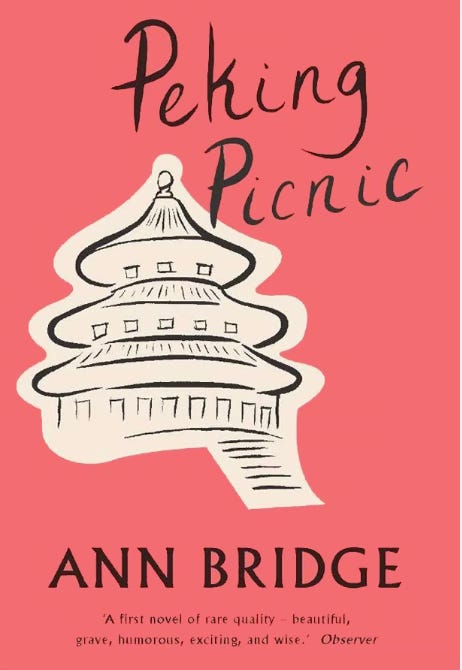Another heatwave - just when you thought it was safe to go back in the garden, temps of 30 degrees C return. I’m hopeless when it gets really hot like this; I get irritable, listless and cross that I can’t carry out my normal activities. I have to wear a hat so I’m in constant flat hair mode, my feet throb and I get headachey. Moan, moan, moan. On the other hand, up to and around 22C I’m a warm weather lover; think loose linen frocks, Birks, casual up-do, a LOT of outdoor time gardening, walking, etc etc. I guess it’s true, all of the people cannot be pleased all of the time. Especially when it comes to the vagaries of the weather. Why are my little introductions nearly always about the weather? I guess it’s a British thing. 🤷🏼♀️
This week’s reading came courtesy of the lovely
after she enquired on Notes if anyone knew the author Ann Bridge, as she was enjoying one of her books and had never come across her before. I hadn’t heard of her either and so off I went to my favourite second-hand online bookstore and picked up a couple of Bridge’s novels. I finished her first novel “Peking Picnic’, published in 1932, and was utterly enchanted by it.Ann Bridge is the pseudonym of Mary Ann Dolling Sanders, born in 1889, the seventh child (of nine) of an American mother and English father. Her father was a successful international businessman and she travelled in Europe with her family as a child. Summers in Switzerland allowed her to develop a strong affinity for mountainous country, and she became interested in mountain climbing. Apparently she was the youngest member of the Alpine Club at the age of 19, with a number of ascents to her credit. In 1909, Mary Ann met mountaineer George Mallory. They became close friends (probably more) and climbing partners. Mallory, of course, was to die on Mount Everest in 1924.
In 1913, on a visit to Scotland, she met Owen St. Clair O'Malley, a British diplomat, and married him the same year. The couple had two daughters and a son. She travelled widely with her husband, living in China, Albania, Turkey, Yugoslavia, Hungary and Portugal, most of them providing settings for her novels. Owen had worked at the Foreign Office since 1911 and remained there during the first war—Mary Ann worked at the Admiralty breaking German ciphers. After the war they moved to a fifteenth-century house at Bridge End, Ockham, Surrey, the house providing her writing pseudonym.
In 1926 Owen was posted to Peking (Beijing) as counsellor with the British Legation, after which there was something of a career blip when he was accused of illegal currency dealing, followed by resignation and reinstatement at a lower salary. Around this time she began writing articles and short stories to supplement their income. Her first novel, Peking Picnic, published in 1932 was a great success, winning the £3500 Atlantic Monthly prize. It was the first in a series of novels drawing on her experiences as the wife of a diplomat and drawing together history, romance, travelogue, and psychology. She also wrote a series of mystery novels introducing amateur sleuth, Julia Probyn (which I’m looking forward to finding!). The Oxford Dictionary of National Biography describes her as an energetic, vibrant woman, enjoying sailing, skiing, and swimming (as well as mountain climbing); speaking fluent French, German, Italian, and Chinese, and a little of other languages, including Mongolian. She was also prone to rattling off telegrams in Latin…
But, back to Peking Picnic. At the heart of the story (in every way) is Laura Leroy, married to the senior diplomat at the British Legation in Peking (Beijing). She is beautiful (of course), intelligent (of course), a little dreamy, a little bored, but an expert in diplomatic hostessing, keeping the hothouse of seeing the same old faces every day cool and smooth. She is loved by all in the Foreign Legations Quarter. She misses England, and she is distressed to be away from her beloved children (at boarding school in England), but she also loves the Chinese people, is fluent in Mandarin, and has come to love Peking and the surrounding countryside. Bridge gives us an exquisite example of a woman caught between two worlds, and it’s this almost ethereal quality that makes the complex Laura interesting and attractive. There are visitors to the Legation, a couple of nieces, an American novelist, a young Cambridge Professor among them and Laura and her friend Nina, together with a few suitably entertaining young men (‘rips’ as they are called), decide on a camping picnic in the hills outside Peking at a huge Temple complex. There are adventures—lost luggage, burdgeoning romances, a run in with Chinese brigands, heatstroke—but the enchantment of this story for me is Bridge’s divine descriptions of the Chinese landscape, the imperturbability of the British upper classes overseas (might be annoying for some but it’s such a picture of the period and the people and the attitudes), and best of all the understanding of the development of love in ‘later’ life and the consideration and pragmatism required to not let the experience go. It seemed to me to be remarkably modern about relationships for a book published in the 1930s and I agreed wholeheartedly with the contemporary review by the Observer: ‘…beautiful, grave, humorous, exciting and wise.’ I read it in two sittings and loved every minute. I shall certainly be reading more.
I also watched the second episode of Outrageous, the TV serial about the Mitford sisters (see last weeks post), and I’m still undecided. I know the stories of these women so well I’m kind of compelled to watch to see how they do it, and at the same time huffing and puffing when there’s something that doesn’t suit me. Like Unity and Jessica being suddenly fully formed Facist and Communist respectively. And again, Deborah is invisible. Heigh ho.
I very nearly didn’t post this this weekend as I have been glued to Glastonbury on the tv and it’s very distracting. What with Neil Young, John Fogerty and Rod Stewart performing incredibly at 78 and 80 respectively, it’s balm for my ageing soul. Hearing Young start his set with a breathy rendition of ‘Sugar Mountain’ sent me waaaay back—walking to school with a copy of After The Goldrush under my arm, trying to be cool…except cool wasn’t really a thing then… Seeing Ronnie Wood join Rod on stage for a blast of a performance of ‘Stay With Me’….Watching Raye, who was magnificent, and Lewis Capaldi (not a dry eye in the field). Occasionally A would wander in and say ‘Who’s that, then?’ and wander off again. There is so much music I don’t know anymore, but Glastonbury is always an opportunity to catch up a little. Once a year, from the comfort of my sitting room.
And there I shall leave you for another week. Next week I am going to start reading Kate Summerscale’s The Peepshow, about the murders at Rillington Place. I just know it’s going to be brilliant, but I will let you know.
Take care and I will write soon. x.








Love to read you weaving "After the Goldrush" into this reflection! (One of my favourite records .. .) Hang in there with the crazy heat.
…or settling down to read a letter (remember them)